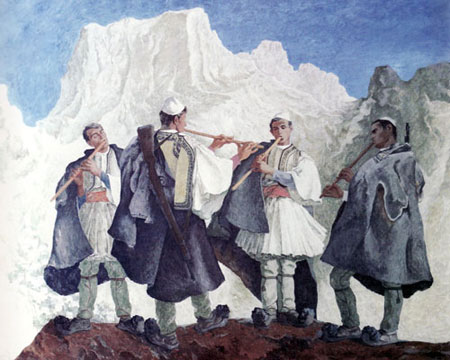| | Robert Elsie | AL Art | AL History | AL Language | AL Literature | AL Photography | Contact | |
Robert Elsie
Albanian Literature
Oral Verse
![]()
BACK
Songs of the Frontier Warriors
INTRODUCTION 8. Mujo’s Courser 16. Mujo and Jevrenija 1. Mujo’s Strength 9. Young Omeri 17. Halili Avenges Mujo 2. Marriage of Mujo 10. Zuku Bajraktar 18. Omer, Son of Mujo 3. Mujo’s Oras 11. Osmani and Radoica 19. Death of Omer 4. Mujo Visits the Sultan 12. Ali Bajraktari 20. Ajkuna Mourns Omer 5. Marriage of Halili 13. Arnaut Osmani 21. Death of Halili 6. Gjergj Elez Alia 14. Zuku Captures Rusha 22. Mujo Wounded 7. Mujo and Behuri 15. Mujo’s Wife Kidnapped 23. After Mujo’s Death
"Shepherds in the Mountains" by Danish Jukniu
The Songs of the Frontier Warriors (Këngë Kreshnikësh) are the best-known cycle of northern Albanian epic verse. Still sung by elderly men playing the one-stringed "lahuta," these epic rhapsodies are the literary reflections of legends portraying and glorifying the heroic feats of warriors of the past. The main cycle, that of "Mujo and Halili," preserves much of the flavour of other heroic cultures such as those mirrored in Homer's Iliad in Greek, Beowulf in English, El Cid in Spanish, the Chanson de Roland in French, the Nibelungenlied in German and the Russian Byliny. The leaders of this band of thirty "agas" or warriors are Gjeto Basho Mujo and his brother Halili, who inhabit a frontier region between the Ottoman Empire and Austria-Hungary. The Albanian songs of Mujo and Halili parallel the Bosnian versions of the cycle sung in Serbo-Croatian, or more properly, Bosnian. This heroic and epic verse occurs in both oral literatures and cultures, since the singers in southern Bosnia, the Sandjak, and Montenegro at the time were to a good extent bilingual, i.e. reciting alternatively in Bosnian and Albanian.
While the Bosnian Slav epic seems to have died out as a living tradition, the Albanian epic is still very much alive. Even as the twenty-first century marches on, one can still find a good number of "lahutars" in Kosova, in particular in the Rugova highlands west of Peja, and in northern Albania, as well as some rare souls in Montenegro, who are able to sing and recite the heroic deeds of Mujo and Halili and their thirty "agas," as part of an unbroken oral tradition. One can safely assume that these elderly men constitute the very last traditional native singers of epic verse in Europe.
TOP
